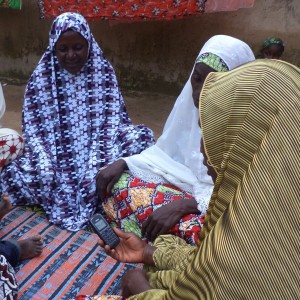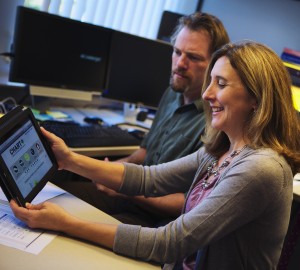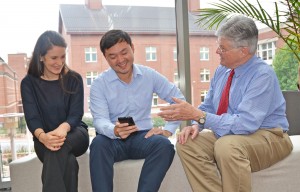mHealth
December 7, 2015
.
UNC Gillings School researchers are harnessing Web-based applications and mobile devices to collect real-time data and deliver interventions to segments of the public – people at risk for diseases, those with high-risk behaviors and patients with particular conditions.
New tools allow them to transcend the usual barriers of time, distance and geography, reaching people in places that formerly were unreachable in ways that never would have been possible.
mHealth – as these mobile health activities are known – enables collection of data and delivery of health-care services by way of smartphones, tablets, computers and other mobile devices.
In the U.S., about 64 percent of the population reports having smartphones; of those, according to the Pew Research Center (tinyurl.com/PewCenter- smartphones), nearly two-thirds have used their phones to obtain information about a health condition.
Smartphone penetration also is a global phenomenon. More than five billion people worldwide use mobile phones – that’s about three-fourths of the world’s adults and more than have access to toilets or latrines. The ubiquity of smartphones, in addition to the integration of the Internet into everyday life, has supported public health research and practice to extend further into communities, adapting to the changing lifestyles of individuals throughout the world.
Mobile technologies provide a potentially scalable and cost-effective platform on which to conduct research, collect data, deliver interventions and improve health. Mobile phones already have had a profound influence on human connectivity, commerce, media and finance.
“Gillings School faculty members and students are creating and evaluating interventions that will provide some of the much-needed evidence regarding who benefits, for what issues and from what kinds of interventions,” says Barbara K. Rimer, DrPH, dean and Alumni Distinguished Professor. “They also are developing new methods for collecting critical health- related data, using mobile technologies that enable real-time and geographically-related collection.”
Researchers and practitioners can track the transmission of infections and responses to natural and human-caused disasters, Rimer says. At their best, the new tools permit public health professionals to prevent and mitigate harm.
Actively and passively collected data from around the world provide essential insights about people and their environments.
“Smartphones and access to the Internet through a host of devices provide global access to people and information,” Rimer says. “We must be the people who develop the interventions, apps and methods for analyzing these troves of data. We also must expose students to the many public health applications of digital data, because they will develop new uses that previously were unimaginable.”
A number of UNC Gillings School researchers are on the cutting-edge of mHealth use – assessing the benefits of technology-based public health and devising new tools to prevent disease and promote health. A very few of their projects were highlighted in the print issue of Carolina Public Health; more examples are available in a listing below this article.
Also available (below) are descriptions of the Patient-reported Outcomes (PRO) Core (pro.unc.edu), led by UNC Lineberger Comprehensive Cancer Center, and the Communication for Health Applications and Interventions (CHAI) Core (chaicore.com).
HIV / AIDS
Kate Muessig, PhD, assistant professor of health behavior, is using mHealth tools to reduce the risk of HIV in North Carolina and in China and other countries.
Some technological applications that work in U.S. communities are transferable and can be of equal or greater value elsewhere. Muessig also works on the development of a peer-support and mHealth-enabled intervention for men who have sex with men (MSM) in China. The intervention aims to help those who are HIV-positive connect with medical care, including HIV treatment and other supportive services (e.g., substance use treatment or mental health services).
“Young, black MSM bear a disproportionate burden of HIV in the U.S. and are one of the only subgroups who continue to experience an increase in HIV transmission,” says Muessig. “The stigma they face poses added barriers to health-positive behaviors and deters access to health care and services. The use of Web- and cellphone-based platforms to build stronger social support among these young people offers a highly accessible and familiar medium for intervention. More than 90 percent have access to the Web and/or a smartphone.”
Muessig says that the research aims to reach people where they are, using a technology and mode of interaction (e.g., social networking) with which they are already familiar.
Chen Zhang, master’s student in health behavior, spent a summer practicum working with Muessig and Lisa Hightow-Weidman, MD, UNC associate professor of medicine, on “Epic Allies.” The mobile game was designed to assist young adults with HIV in adhering to their medicine regimens, providing them with social support, education about HIV and rewards for taking medication, all presented by way of an engaging superhero theme.
Pain control
Christine Rini, PhD, research associate professor of health behavior, works with collaborators at UNC and Duke on a Web-based skills training program for coping with pain. She and colleagues noted that clinicians underuse evidence-based behavioral treatments that help people manage persistent pain.
“Providing the treatments is resource-intensive, usually requiring multiple in-person meetings with a trained clinician,” Rini says. “Online training expands access to the treatments.”
The expanded access benefit of mHealth interventions makes scale-up possible in a way that could not have occurred previously. This can make a real difference in areas of need such as genetic counseling, in which the already too-few counselors are not geographically widespread.
To change that, Rini is collaborating with a team of UNC and RTI International researchers to deliver Web-based support for patients to make decisions about whether and how to use genomic sequencing for newborn screening. She also works with others at UNC to provide Web support for genomic screening of people with no apparent health concerns.
Saving babies, saving money
Valerie Flax, PhD, research assistant professor of nutrition, and Margaret (Peggy) Bentley, PhD, Carla Smith Chamblee Distinguished Professor of Global Nutrition and associate dean for global health at the UNC Gillings School, conducted a Bill & Melinda Gates Foundation-funded, cluster-randomized, controlled trial in Nigeria to test the efficacy of a breastfeeding promotion intervention integrated into a women’s microcredit program. The intervention included three components – monthly breastfeeding learning sessions led by credit officers during regular microcredit meetings, biweekly breastfeeding messages sent to cell phones provided for small groups of microcredit clients, and songs and dramas about breastfeeding created by small-group members.
“I became interested in using mHealth in a community-based health promotion intervention as a way of sustaining dialogue about breastfeeding between monthly learning sessions,” says Flax. “Voicemail and text messages via cellphone can prompt people to discuss a health topic. This can help to shift local norms related to specific health behaviors and generate social support for group members to carry out the optimal behaviors. It also provides an opportunity for health messages to reach other members of the community, creating a spillover effect.”

Nigerian women in Dr. Valerie Flax’s study who received cellphone messages about breastfeeding were more likely to breastfeed exclusively. (Photo courtesy of Partners for Development)
Flax says that mHealth does not have to be about the latest technologies or have fancy bells and whistles. “By using basic SMS and voice messages sent to a group phone, we substantially increased exclusive breastfeeding in a part of Nigeria where optimal breastfeeding practices have been declining for decades,” she says. Among microcredit clients who were pregnant at the start of the study, 64 percent of women who received the breastfeeding messages later reported that they exclusively breastfed their infants to age six months, compared with 43 percent of women who did not receive the messages.
Flax’s study, co-authored with Bentley, Sheila Leatherman, MSW, research professor of health policy and management, and others, appeared May 8, 2014, in the Journal of Nutrition.
Obesity prevention
Deborah F. Tate, PhD, professor of health behavior and nutrition, has developed Internet-connected interventions to help people lose weight and maintain their weight loss since 2001, when her first paper was published in the Journal of the American Medical Association.
Tate pioneered use of electronic health (eHealth) interventions for weight loss, and her interventions now pair mobile device-delivered weight-loss
tools with high-tech scales and activity trackers to record and send data to the research team. eHealth interventions developed by Tate and her team consistently have produced at least 5 percent weight loss, a level which is beneficial to health.
Doctoral work by Dori Steinberg, PhD, then Tate’s advisee, found that using only wireless scales and email helped participants, on average, lose more than 13 pounds. Steinberg won a Gillings Dissertation Award for the research, and she and Tate were among co- authors of findings published in Obesity in 2013.

Dr. Deborah Tate (foreground) and Randall Teal work together in the Communications for Health Applications and Interventions (CHAI) Core. (Photo courtesy of the American Psychological Association, © 2015)
Tate, who is conducting two NIH-funded research studies with mHealth interventions and data collection, is developing tools that can help people where they live, work, play and pray – in real time. The rich data trove resulting from the tools provides objective and highly individualized outcome information that can be made into tailored messages.
“Through technologies such as Bluetooth scales, wireless activity trackers and GPS location data, we have opportunities to deliver more relevant messages with less of a burden on our participants,” says Tate. “We can deliver better messaging at the right time. Having the right messages to go with the data is important – the marriage of message and data is critical in addressing big public health problems.
A hybrid of mobile technology and hands-on intervention may prove the best way to effect change.”
Managing chronic diseases
Thanks to a pilot project funded by a Gillings Innovation Lab (sph.unc.edu/gil), researchers are exploring how high-tech and “soft-touch” interventions can be used together to help diabetes patients manage their disease. Led by Edwin B. Fisher, PhD, professor of health behavior, Peers for Progress marries peer support and eHealth. To extend the reach and efficiency of peer support, Fisher will use eHealth systems to monitor status and progress and offer tailored messaging to guide behaviors. Previous research has shown the benefits of peer support in diabetes but not how to scale up these approaches to have significant impact upon the 387 million people with diabetes worldwide.
“eHealth resources enable peer supporters to reach more people while providing extra contact and encouragement to those who may benefit from them,” says Fisher. “High-tech is not antithetical to the ‘soft touch’ of peer-to-peer support but is rather a natural complement to it.”

Dr. Ed Fisher (right) reviews a Peers for Progress app with student assistant Sarah Kowitt and program manager Patrick Yao Tang. (Photo by Linda Kastleman)
Patrick Yao Tang (MPH, 2012), program manager with Peers for Progress, agrees.
“Numerous studies have documented the effectiveness, feasibility and wide acceptability of lay health coaching for diabetes self-management in diverse settings and populations,” he says. “On their own, eHealth interventions also have shown promising results for diabetes self-management. This model
can improve the health of populations by mobilizing lay health coaches and other health-care resources to target high-need patients while providing a standard of care to the bulk of the population.”
This, in turn, Tang says, has the potential to improve health outcomes, reduce costs and improve population health.
Marisa Domino, PhD, professor of health policy and management, is piloting use of mHealth interventions for people who have diabetes and also have severe mental illness (SMI), e.g., schizophrenia and bipolar disorder.
While mHealth technologies have shown promise in improving diabetes management, individuals with SMI face additional challenges, including their feeling less comfortable with group activities. Domino will audition two mHealth applications by using them in home settings with these individuals. The aim is to improve self-care in a particularly hard-to-serve population.
Domino is director of the Program on Mental Health and Substance Abuse Systems and Services Research at UNC’s Cecil G. Sheps Center for Health Services Research and training program director for the UNC- Duke Training Program in Mental Health Systems and Services.
– Michele Lynn
UNC’s MEASURE Evaluation: Collecting data and using it to improve health
.
Delivering empirically-based patient and public health interventions online holds considerable promise for increasing people’s access to programs. Many exciting mHealth research projects are being led by Gillings School faculty members. One much larger UNC project, encompassing hundreds of activities, is also of note.
UNC’s MEASURE Evaluation, based at Carolina Population Center and funded by the U.S. Agency for International Development, has strong connections with UNC’s public health school. Jim Thomas, PhD, associate professor of epidemiology, directs the program, and nine public health faculty members are on the staff, sharing the program’s focus on education and research that informs and guides public health decision making.
To facilitate good decisions on health policy and service provisions and to track health trends and the effectiveness of interventions, there must be high-quality data. MEASURE Evaluation is a leader in health informatics, a health information system empowered and amplified by technology.
“MEASURE Evaluation strengthens health information systems in developing countries to inform programs about how well they are operating and to improve their impact,” says Heidi Reynolds, PhD, MEASURE Evaluation’s director for evaluation.
Reynolds says that mHealth is one of a suite of interventions used by MEASURE Evaluation. “Our past work has shown that it’s important to strengthen the entire system for mHealth to be effective,” she says.
MEASURE Evaluation’s impact is significant and global. With project topics ranging from gender-based violence care and support in Botswana to best practices in mobile technology for monitoring and evaluation and health information systems in low- to middle-income countries, the organization supports public health practitioners throughout the world to make better decisions, leading to better health outcomes for countless individuals globally.
The project has used mobile data collection (tablets and mobile phones) for a variety of studies. For example, a “Priorities for Local AIDS Control Efforts” (PLACE) study in the Dominican Republic used mobile tablets loaded with the Open Data Kit, a mobile data-collection platform, to identify populations at high risk of HIV, common points of transmission and whether HIV services are available in high-risk areas. Mobile tablets also were used to collect data for an organizational network analysis in Homa Bay, Kenya. That study aimed to strengthen the HIV referral network to ensure that patients who test positive will receive appropriate treatment.
Project team members also conduct operational research on South Africa’s national MomConnect program, which uses mobile messaging to deliver preventive health messages to pregnant women.
– Michele Lynn
Additional examples of mHealth research
These descriptions are not included in the print version of Carolina Public Health.
HIV/AIDS
Kelly A. Knudtson, MPH, qualitative health researcher and GIS analyst with the UNC Institute for Global Health and Infectious Diseases, uses mHealth to engage and retain young people with HIV in their care and treatment.
Emily Pike, health behavior master’s student, worked with Lisa Hightow-Weidman, MD, in UNC’s Institute for Global Health and Infectious Diseases from 2009 until May 2015. She used technology to engage HIV-positive youth in their care and treatment and also to provide education and tools to HIV- negative youth.
For several years, Beth Schaffer, doctoral student in health policy and management, has supported a multisite randomized controlled trial of a text-message intervention to support patients beginning treatment for HIV/AIDS in Burkina Faso. Given widespread access to mobile phones, Schaffer and collaborators are exploring to what extent this everyday technology can be harnessed to support patients beginning antiretroviral therapy. Text-message reminders are sent to patients, prompting them to take their medications and return to the health center for appointments. The research aims to determine whether text messaging encourages patients to remain in care and adhere to prescribed treatment regimens.
Obesity prevention
Leslie Lytle, PhD, professor and chair of health behavior, developed Choosing Healthy Options in College Environments and Settings (CHOICES), a technology-based program for two-year community college students to help prevent unhealthy weight gain. The National Heart, Lung and Blood Institute-funded research evaluated two easily-disseminated approaches – a course, offered face-to-face or online, as well as a Web-based approach that allowed students to track their weight and weight-related behaviors, receive information from experts and communicate with each other.
Brooke Tompkins Nezami, doctoral candidate in health behavior, conducted as part of her dissertation an mHealth intervention study with mothers of preschool children. Her research interests in maternal and child obesity, with specific focus upon preventing child obesity by working with mothers of young children, led her to develop a low-intensity intervention in which mothers could receive most program content through their smartphones.
The “Smart Moms” intervention significantly reduced children’s consumption of sugar-sweetened beverages by 7.8 ounces per day (compared to a reduction of 0.7 ounces in the control group) and increasing maternal weight loss (2.3 percent loss, compared to a gain of 0.8 percent in the control group). The six-month study, funded by a Gillings Dissertation Award, won first place in a student research competition sponsored by the American Institute for Cancer Research and held at the annual meeting of the Obesity Society. Nezami will submit her outcomes paper for review by January 2016.
Cancer
Ethan Basch, MD, associate professor of health policy and management at the Gillings School and of hematology and oncology in the School of Medicine, is director of UNC Lineberger Comprehensive Cancer Center’s Cancer Outcomes Research Program. Basch’s research program electronically collects symptom information from patients in cancer care and drug development. He and colleagues have developed tools for patients to self-report their symptoms via the Web, handheld devices or automated telephone systems, a process that improves symptom detection and patient quality of life and satisfaction, as well as reducing emergency department visits and hospitalizations and improving quality-adjusted survival. He works closely with federal agencies, particularly the U.S. Food and Drug Administration, to develop approaches for collecting patient-reported information that can inform drug development and patient decision-making.
In an article published in JAMA Oncology in August 2015, Basch and colleagues for the National Cancer Institute show that a system they developed accurately and reliably captures the patient experience with cancer drug side effects. Bryce Reeve, PhD, professor, and Antonia Bennett, PhD, research assistant professor, both in health policy and management, were study co-authors.
Carmina G. Valle, PhD, research assistant professor of health behavior, focuses on cancer prevention and control, with an emphasis upon the use of emerging technologies to promote physical activity and healthy weight in cancer survivors and underserved populations. Valle has conducted physical activity and weight- control interventions for cancer survivors using Facebook and objective monitoring devices, such as digital smart scales and activity trackers. Her current projects include evaluating the effects of theory-guided, tailored health messages about engaging in cancer prevention behaviors and culturally adapting a tailored health assessment tool for Latino cancer survivors.
Women, children and adolescents
Smisha Agarwal, doctoral candidate in maternal and child health, is helping to complete evaluation of a pilot project that focuses upon family planning in Tanzania, the results of which will be disseminated to Tanzania’s Ministry of Health. The project uses a mobile phone-based job aid developed by FHI 360 that guides community health workers to screen women for pregnancy, provide knowledge about contraceptive methods and refer them to a health facility, if needed.
“In areas with a shortage of skilled health workers, tools such as this can help less specialized workers complete fairly complex tasks,” Agarwal says.
Agarwal serves on the World Health Organization’s mHealth Technical Evidence Review Group (mTERG), which is comprised of mHealth experts representing ministries of health, academic and research institutions, and implementing organizations. mTerg has developed best practices related to use of mHealth innovations for strengthening health systems. She leads the development of a reporting tool to support complete and transparent reporting of mHealth evidence.
Christina Villella, master’s student in health behavior, was a summer 2015 fellow at IntraHealth International. She worked on brainstorming use cases for IntraHeath’s mHealth application, mHero, designed to help Ebola-affected countries build more resilient health systems. The tool facilitates communication between ministries of health (and other organizations that employ health workers) and health workers in facilities and in communities. In addition, she catalogued mHealth applications that support health workers in delivering family planning and maternal, neonatal and child health services. The goal was to understand existing mHealth evidence and document gaps in current mHealth activities. Using this research, Villella made recommendations about ways IntraHealth could use its organizational expertise in future mHealth activities.
Liz Chen, MPH, doctoral student in health behavior, co-founded MyHealthEd, a comprehensive, online health education course tailored to students’ individual needs. The goal is to increase access to high-quality sex education among high school students in low-resourced, rural communities across North Carolina. Originally funded through crowd sourcing, MyHealthEd is now supported through a $50,000 State Employees’ Credit Union Foundation grant as a result of the program’s winning the N.C. State University Institute for Emerging Issues’ Prize for Innovation.
Ania Berchuck, Justin Chu, Giuliana Morales, Christin Stewart and Chen Zhang, Master of Public Health students in health behavior, are collaborating with IntraHealth International to develop an evidence-based mobile app promoting breastfeeding among low-income African-American mothers. They are adapting an Indian-made mobile app, mSakhi.
Breastfeeding rates are relatively low among African-Americans. The absence or limited amount of breastfeeding is associated with increased rates of childhood obesity and other adverse health conditions. The mobile app, which focuses on challenges faced by this group, is intended to educate and strengthen peer support networks among mothers. The goal is to have more mothers who breastfeed, resulting in more healthy children.
Collecting data and using it to improve health
Michael R. Kosorok, PhD, W.R. Kenan Jr. Distinguished Professor and chair in biostatistics, works with faculty and student collaborators to develop statistical machine learning tools for using cell phones to monitor and intervene in patient behaviors to improve health outcomes. Such interventions might include strategies for diet, exercise or insulin intake and would be recommended through an application on the patient’s cell phone.
Muad Hrezi, an undergraduate in health policy and management (class of 2016), spent summer 2015 in Rwanda, working with the minister of health to document the ministry’s progress in eHealth. His projects included helping write a book on the eHealth system and contributing to a study of the mHealth system RapidSMS, used for the last six years by the Rwandan government to address maternal and child health concerns.
Resources
CHAI Core (Communication for Health Applications and Interventions Core)
The CHAI Core works to apply state-of-the-art resources and techniques to the development of high-quality and rigorously evaluated behavioral science interventions aimed at health promotion and disease prevention. An NIH-funded core facility, CHAI Core is the primary resource for UNC investigators to obtain services in many areas, including Web and mHealth intervention development.
“We are a resource to help researchers focus on evidence-based techniques that will change behaviors,” says Anne Cabell, MPH, CHAI Core administrative director. “We help them design technology-based interventions that will work effectively and will reach study participants where they are. Many populations find their only Internet access is with a smartphone, so we optimize our sites so they can be viewed easily on a phone.”
PRO-Core (Patient-Reported Outcomes Core)
PRO-Core offers a survey system platform and consults with UNC investigators on incorporating patient-reported outcomes in their research. Surveys and forms can be completed on smartphones, tablets, laptops, PCs – any device with a Web browser. Surveys also can be administered by automated telephone system, a good option for participants without home Web access or with limited literacy.
Data collected from “wearables,” e.g. fitness bands, heart rate monitors, and related devices, from brands such as Fitbit™, can be integrated seamlessly into PRO-Core study datasets. The options of sending automated survey reminder emails or phone calls – and creating customized reports about enrollment and survey completion rates – reduce staff time required to manage longitudinal or multi-arm studies.
“It is always interesting to talk with investigators about their research,” says Antonia Bennett, PhD, research assistant professor of health policy and management and faculty director of PRO-Core. “We like to start early, to talk about whether PRO-Core would be a good fit, and help investigators think about study design and data collection strategy related to the survey assessment. Many decisions are guided by thinking about the study from the participants’ perspective.”
Carolina Public Health is a publication of the University of North Carolina at Chapel Hill Gillings School of Global Public Health. To view previous issues, please visit sph.unc.edu/cph.




